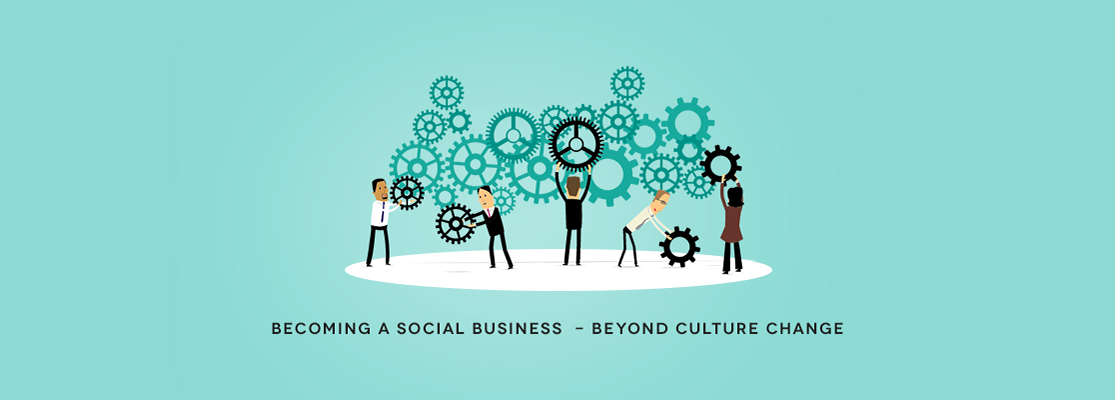BECOMING A SOCIAL BUSINESS – BEYOND CULTURE CHANGE
“A paradigm shift occurs when prevailing mental model has so many egregious anomalies that it “breaks” and a new mental model of the world is perceived to be a better explanation of how the world works.” ~ Steve Denning
Our words define our worldview. We use the vocabulary available to us to describe and analyze our experiences and perceptions. The founder of the idea that language and worldview are inextricable is William von Humboldt, the Prussian philologist. The German word Weltanschauung—used to represent the mode of apprehending reality of a community—was first used by Kant and later popularized by Hegel.Weltanschauung represents the collective consciousness of a community of a certain experience.
In this context, I had a bit of an epiphany. Over the past few years, the need to become a social business and to promote enterprise-wide collaboration have taken hold in many organizations. The usual approach is to launch an enterprise collaboration platform (technology first being easy to do) and hope that people will engage and contribute with a bit of cajoling and coercing. But a majority of these endeavors fail leading to skepticism and finger pointing. The usual culprits are the hapless organizational culture closely followed byhierarchy and leadership lethargy. We have become accustomed to blaming the culture of an organization for the failure of any initiative, and more so when the change calls for redefining and re-imagining how people work and interact. Before I proceed further, let me clarify that these culprits are not blameless. A fair number of mistakes can be attributed to them. I only want to say these do not invoke the complete picture. We have to dive deeper to understand why organizations across the world – from the Americas to Asia – are apparently making the same mistakes.
We have to take a step back and examine the metaphors and the discourse that organizations abide by and are described by. The crux of the problem lies in our inability to see how the culture of organizations stem from and is shaped by the very discourse of management that we have collectively subscribed to ever since the Industrial Revolution and the manufacturing era. No matter how hard we try to change the culture – and I do believe that leaders and managers are trying – the discourse we use lets us down. The words become reality. Currently, our management discourse is permeated by the language of two metaphors – the military and the manufacturing. The business model and operating principles in today’s organizations hinge on “making” profit through the deft use of limited resources in an organized manner. The military metaphor dominates the world of business – right from “staff”, “line”, “chain of command”, to “war for talent”, “competitive strategy”, and “line of fire”. The assumption is that doing business is akin to waging war and it becomes a self-fulfilling prophecy. Organizations thus begin to behave with an almost “military” mindset – valuing planning over innovation, dwelling on constraints over opportunities, giving in to enforcing over enabling, compliance over collaboration.
Underlying this military and manufacturing discourse is an insidious and difficult to pin down aspect – the scarcity mindset – be it of money, skills, information, time, talent, and so on. A world defined by scarcity is driven by the ethos of competition, hoarding, survival of the fittest, suspicion, exclusion, elimination of the other, and fear. These concepts are fundamentally opposed to the principle and values that support cooperation and collaboration – the pillars of social business and authentic communities. As long as our organizations are operating under the principle of scarcity, we will continue to struggle to get people engaged and motivated enough to collaborate. The words we use not only reflect but also reinforce and reproduce the reality. The words become reality.
Now, let’s look at the words that come to mind when we think “community” which has its root in the Latin word “communitas” meaning things held in common. Community elicits in my mind words like commune, abundance, love, wholeness, trust, belonging, authenticity, creation, safety, inclusion… and other similar words. As anyone who has ever been or aspires to be a community manager, we know that these are the emotions that we have to inspire in our users for them to become engaged and collaborative community members. However, the discourse that defines community within organizations get subsumed under the larger discourse of the organization itself which, as I have already mentioned, is defined by scarcity and competition. When the two discourses clash, the larger one signifying the organization as a whole inevitably wins. The words become reality.
Let me make a disclaimer. This clash is not the fault of managers or leaders taking the organization forward – in most cases, it is done in good faith. Controls are put in place to prevent information from going to competitors; non-compliance is punished; transparency is censored to prevent general dissent. And we simplistically club all of these under the umbrella of an amorphous and ambiguous culture and dismiss it by saying that “the culture of the organization is not conducive to collaboration”. We have to identify the words that run counter to authenticity, trust and transparency and replace them with a different set of words when speaking about organizations. Words carry their own denotation and connotation and define our consciousness. It might seem like a trivial matter, but it truly has deep implications for the kind of transformation organizations need to go through in order to become authentic communities.
The discourse of communities doesn’t and cannot hinge on and around scarcity. We need to redefine and reimagine the very description of an organization itself. What if we were to define an organization like a community: “Self-organized network of people with common agenda, cause, or interest, who collaborate by sharing ideas, information, and other resources…” (Wikipedia). We have to shift from the old ways of working that was driven by extrinsic motivation – bonus, salary hike, promotion, and other tangible rewards to one that is driven from the heart, that engages people intrinsically by giving them the autonomy, providing the purpose and creating a sense a belonging. Jeremy Scrivens writes in his post, The Future of Work is Social Business at Scale, “… authenticity is not only the foundation of collaboration and innovation, it is the very experience of being well – being who you really are – Being! not just doing.”
Tangible rewards are limited, and hence automatically lead to competition and fight for survival. In contrast, intrinsic motivation, authenticity, trust, and kindness stem from a deeper source of abundance. Organizations need to shift their paradigms and transform at a far deeper level than we are currently addressing. To see real impact, and deep and lasting transformation, we have to attack the root, and reimagine the organizational metaphor.
Written by our Guest Blogger, Sahana Chattopadhyay
Sahana Chattopadhyay is an L&D Consultant, OD Specialist, Blended Learning Architect, Social Learning Evangelist, and Blogger.
Sahana’s work cuts across performance consulting, workplace learning strategies from formal to informal and social learning, knowledge management methodologies and adult learning principles. She is passionate about helping organizations become learning organizations through community building, enabling personal knowledge management, and bringing working and learning together.
Sahana has appeared in the list of Top Ten e-Learning Movers and Shakers for the Asia Pacific region for four consecutive years from 2011 to 2014, topping the APAC list in 2014 and appeared in the top ten of the global list.
_________________________________
Copyright of posts written by our Guest Bloggers are their own.
Published on 14-Dec-2015






